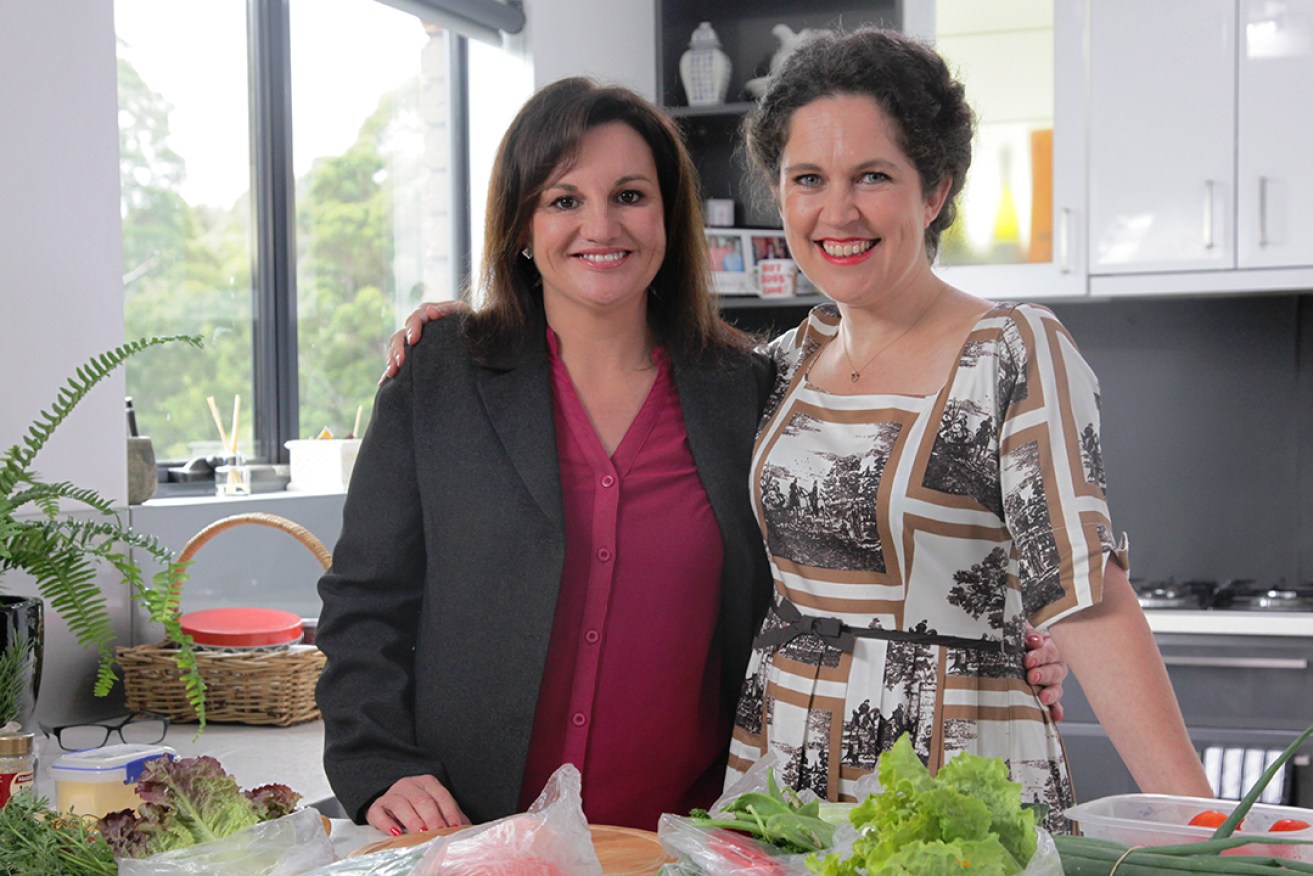Is Crabb’s Kitchen Cabinet too cosy?
The ABC’s cooking-with-pollies show ‘Kitchen Cabinet’ is back with a new season – and has once again sparked criticism from some quarters over host Annabel Crabb’s “softball” interviews.

Senator Jacqui Lambie with Annabel Crabb on Kitchen Cabinet.
When I first saw promos for Annabel Crabb’s cooking with politicians show Kitchen Cabinet back in 2012, my initial reaction was something along the lines of: “What fresh hell is this?”
If watching amateurs cooking on MasterChef, Junior MasterChef and Celebrity MasterChef wasn’t enough, we were going to have to endure the ABC’s version: Pollie MasterChef, with Crabb’s bubbly effervescence there to offset some of the least charismatic cooks to ever grace our screens.
Had politics become so strongly about personalities that we needed to see our politicians in this fluffy format on the national broadcaster? Was the ABC really jumping onto the blockbuster cooking-show bandwagon by awkwardly bringing politics into the kitchen?
But Crabb’s skills as a host, and the openness of the format, have proven more compelling and revelatory than I’d expected. The show found its groove immediately: the cooking element always took a backseat to a casual and often very personal discussion of a politician’s career and their motivations.
There have been plenty of people disappointed that Crabb’s interviews are so softball. In a widely discussed article last year Amy McQuire called the show “junk food journalism”, and labelled it “insidious propaganda”. Fairfax TV critic Ben Pobjie wrote:
“What a government minister is like at home – or in the kitchen – is irrelevant to the country: what matters is what they do. And the more we get to know them personally the more we fall for the lie that ‘what they’re really like’ is important.”
These criticisms emerged after last year’s episode featuring former Immigration Minister and now Treasurer Scott Morrison. Critics were angered that the ABC gave this very friendly half-hour platform to a man who, for years, famously evaded important questions about the treatment of asylum seekers. It was pretty difficult to watch this person, accused of some pretty severe human rights abuses, cheerfully cook a Sri Lankan curry (totally not a calculated move on his part…) and talk about his faith, family and moral code, largely unchallenged.
With last week’s episode featuring Tasmanian Senator Jacqui Lambie, the same criticisms came up again, particularly when people started gushing over how forthright, honest and likeable they found Lambie. Yes, the same woman who last year said the Grand Mufti of Australia should be forced to wear an electronic monitoring ankle bracelet.
Many critiques of the show tend to come down to the idea that it’s poor journalism, which is a bit of a misnomer: the show isn’t journalism and can’t be judged on that basis.
Crabb’s background in political reporting and commentary makes these interviews, as softball as they are, consistently engaging and entertaining. This show isn’t about drilling politicians for tough answers — there are other places on the ABC for that format of interview. In fact, it’s not even really a show about politics directly; it’s more broadly about culture. (Although, obviously, most of our elected representatives come from pretty similar backgrounds.)
Pobjie is mostly right: what a government minister is like is irrelevant to the country in an individual respect. But it’s a worthwhile cultural exercise to attempt to understand people in power and what might motivate their actions, even if Crabb only uncovers that occasionally.
Through these individual conversations, audiences are offered a chance to understand the attitudes and cultures which shape policy and the opinions taken on by elected representatives across the country. That’s inherently valuable, both culturally and politically, and cannot be achieved to the same extent in news or current affairs journalism.
Kitchen Cabinet is obviously useful to politicians wanting to soften or spice up their image. But I’m troubled by the idea that voters are apparently so unable to separate policy and personalities that they’ll think “Scott Morrison seems like a nice man to have lunch with — he wouldn’t do anything bad to desperate people!”
It’s true that probing and cynical journalism is often thin on the ground in Australia — although as a national broadcaster, the ABC still does a pretty decent job — and it’s true that we need more outlets and writers who will expose power imbalances and the human cost of the decisions made by those in power. But Kitchen Cabinet doesn’t come at the cost of this kind of reporting.
In an interview with Crikey last year, veteran political reporter Laurie Oakes offered a simple but clear perspective:
“If all we had was the [kind of interview done by Kitchen Cabinet] we wouldn’t be well served. But if we didn’t have it we wouldn’t be well served either.”
I hope people who watch Kitchen Cabinet do so with their own sense of cynicism and understanding of the purpose of the program and the role Crabb is playing. It comes with its dangers, but it’s a compelling and worthwhile piece of television.
Kitchen Cabinet airs on the ABC on Thursdays. Tonight’s episode will feature Labor Senator Sam Dastyari.
This article was first published on The Daily Review.




